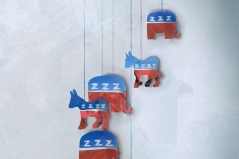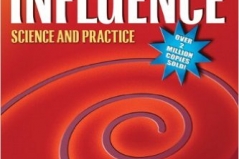Asking Children to Talk About Abuse: Can Research Help Improve Police Interviewer Skills?

keywords:
Child interviewing / Police training / Sexual Abuse / Children’s Testimony / NICHD protocol
Asking Children to Talk About Abuse: Can Research Help Improve Police Interviewer Skills?
Child abuse cases often lack corroborative evidence in the form of injuries, DNA or direct witness observations. Instead, the most important source of information about the alleged crime is typically the child’s testimony. A wide range of factors can influence children’s capability and willingness to disclose abuse during a police interview. Hence, the child interviewer needs to elicit reliable information from children without influencing their testimony. The National Institute of Child...
/ moreSleepy Politics: How Sleep Deprivation can Affect Political Decision Making

keywords:
sleep deprivation / group decision making / politics
Sleepy Politics: How Sleep Deprivation can Affect Political Decision Making
In today’s political landscape, important decisions are often made by those who are severely sleep deprived. This raises the question of potential consequences of sleep deprivation for political decision making. Psychological research on the effects of sleep deprivation on cognitive functioning, decision making, communication, and coordination in groups can help to answer this question. There are several effects of sleep deprivation indicating that it could have negative consequences. For example, sleep-deprived individuals are less flexible in changing plans and courses... / more
Adverse Childhood Experiences and its lifelong consequences
Adverse Childhood Experiences and its lifelong consequences
Unfortunately, some children grow up with maltreatment and household dysfunction. In this post, I will explain how these adverse childhood experiences (ACEs) not only have a negative influence during childhood, but later on in life as well, and I will give some advice about how to prevent these long-lasting negative outcomes.
/ moreMoral Disengagement: How People Do Harm and Live With Themselves
Moral Disengagement: How People Do Harm and Live With Themselves
We all know popular cases of people who became known for their immoral behavior: Think of Lance Armstrong, professional cyclist and seven-time-winner of the Tour de France, convicted for doping. Or the Abu Ghraib prison guards, soldiers of the U.S. army, who took photos while humiliating and abusing Iraqi prisoners under their protection. These, of course, are prominent examples that come readily to mind. However, immoral behavior also happens on the “smaller scale”: Every day, people commit tax fraud,... / more
Influence: Science and Practice (5th ed)
Influence: Science and Practice (5th ed)
“Over 2 million copies sold!” The cover says it all. No, not about the popularity and prominence of the Influence: Science and Practice, but rather about the subtle ways in which our attitudes, behaviors, and perceptions of value can be manipulated by people who have knowledge of what Robert Cialdini calls “the weapons of influence.” According to Cialdini, a Distinguished Professor of Psychology at Arizona State University and a legendary figure in... / more
Why Has Donald Trump Lost So Much Conservative Support?
Why Has Donald Trump Lost So Much Conservative Support?
Donald Trump has lost the support of many conservatives, a problem that may be explained by his lack of conscientiousness. This trait is more characteristic of conservatives than liberals, which makes it a critical trait for conservative candidates. In the case of Trump, a lack of conscientiousness has likely repelled conservative voters who would otherwise vote Republican in the presidential election. Nevertheless, Trump maintains... / more
Elephants and Donkeys Are Killing The United States: Why We Need Political Diversity
Elephants and Donkeys Are Killing The United States: Why We Need Political Diversity
While the opinions expressed in our own social networks may overwhelmingly predict our presidential candidate winning by a landslide, almost half of Americans polled support the candidate we oppose. As Democrats and Republicans have increasingly distanced themselves socially and physically from each other, we have found ourselves doubling down on our own moral superiority and demonizing anyone who doesn't agree with our point of view. This political polarization may help our own group in the short run,...
/ moreAre Perceptions of Election “Rigging” Racialized?
Are Perceptions of Election “Rigging” Racialized?
Republican presidential nominee Donald Trump has departed from the usual norms of campaigning by repeatedly alleging that the November election is “going to be rigged” by his opponents. In recent research, we find that concerns about the fairness of elections in the current era may have an insidious racial component. Specifically, we present evidence indicating that White Americans with more negative attitudes toward African Americans were more likely to see the 2008 and 2012 elections as...
/ moreWas that how it happened? Shaping our memory for personal experiences in conversation with others

keywords:
conversational remembering / memory distortions / retrieval induced forgetting / reconstructive memory / recalling experienced events
Was that how it happened? Shaping our memory for personal experiences in conversation with others
Conversations with others can alter our memories for life events. Our purpose in relating a story, and how our audience receives it, are factors that influence our selection of what details to include. The account we produce on one occasion may be maintained in subsequent retellings. Ultimately, we may report--and in some case come to believe--narratives that are not entirely factual. In this article, we will discuss research on the processes through...
/ moreMind: A Journey to The Heart of Being Human
Mind: A Journey to The Heart of Being Human
What is mind? Is it brain activity resulting in consciousness? Are mind and consciousness synonymous with each other? Is self-awareness an illness that leads to despair, or is physicality a curse that creates the delusion of separateness leading to alienation and melancholy? Defining the mind might... / more







